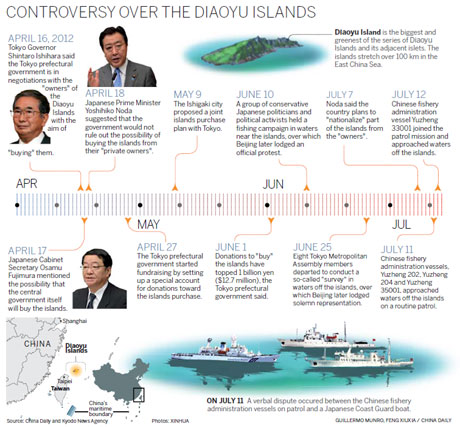

Japanese politicians aim to win more seats by stirring up dispute
Tokyo's sensationalizing of the Diaoyu Islands issue will stir up nationalism within the country and help more right-wing politicians win seats in parliament, which will inevitably cast a long-term shadow over China-Japan ties, analysts warned.
The analysts made the remarks as the local government and cabinet are weighing plans to "buy" or "nationalize" the Diaoyu Islands, which have stood under Chinese sovereignty since ancient times.
Japanese politicians represented by Shintaro Ishihara, governor of Tokyo, have attempted to use the Diaoyu Islands issue as a tool to win support in future elections, said Liu Jiangyong, an expert on Japanese studies from Tsinghua University.
Hawkish right-wing politicians such as Ishihara use the Diaoyu Islands issue to raise nationalism among the Japanese public, Liu said. This will negatively affect Sino-Japanese relations, he added.
Liu's comments came on the heels of Japanese Ambassador Uichiro Niwa's return to Beijing on Monday after being summoned to Japan on Sunday by the country's foreign ministry.
The Japanese embassy in China confirmed Niwa's arrival with China Daily, but refused to say whether or when he will communicate with China.
Diplomatic sources said Niwa will convey the messages with China in an informal way.
Niwa on Sunday discussed "new trends" and countermeasures concerning the Diaoyu Islands with Japanese Foreign Minister Koichiro Gemba, according to Japan's Kyodo News Agency.
Gemba instructed Niwa to "properly explain Japan's stance to China" toward the disputed islands when he returned to Beijing.
"The Foreign Ministry claimed Niwa's return to Japan is not a 'recall' aimed at protesting against China. However, a temporary visit home, as a diplomatic convention, is often used as a countermeasure," Kyodo said.
Tensions between China and Japan have risen since April, when Ishihara said that his city prefecture was negotiating with the "owners" of the Diaoyu Islands to "buy them by the end of the year" and began raising money for the proposal.
On July 7, Japanese Prime Minister Yoshihiko Noda said his government was negotiating with a "private owner" to "nationalize" part of the Diaoyu Islands, which are in Chinese territorial waters.
Japanese politicians have tried to cover up the unstable domestic political situation by raising the sensitive Diaoyu Islands issue, Liu said.
The seabed around the Diaoyu Islands contain rich natural resources and possess a strategic value, said Ruan Zongze, deputy director of the China Institute of International Studies.
The islands may serve as a strategic shield for Japan, and "the islands' geopolitical value outweighs the importance of the oil and gas buried in the region", he said.
Reports released in the late 1960s pointed out the possibility of rich undersea oil and gas resources in the East China Sea beneath the waters off the Diaoyu Islands.
As an islands country, Japan has traditionally maintained a strategy of expanding its territorial waters, Ruan said, adding that Tokyo's lasting claim over the so-called Okinotori Atoll is another example.
Japan's continued interest in the natural resources of the islands is integral to Tokyo's recent drive to purchase them, but it cannot change the fact that the Diaoyu Islands are in China's territory, which has been proved by rich legal and historical evidence, analysts said.
Contact the writers at zhouwa@chinadaily.com.cn and zhangyunbi@chinadaily.com.cn







